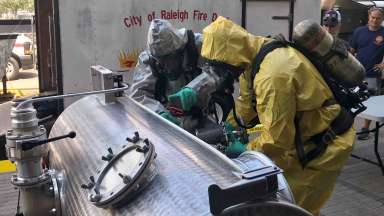In the aftermath of the East Palestine, Ohio, train derailment, hazmat teams across the country have been in the spotlight. The train in East Palestine had toxic, cancer-causing chemicals on board and ignited a fire that lasted several days, spewing poisonous fumes into the air, killing wildlife, and temporarily displacing residents.
The Raleigh Fire Department’s hazmat team is trained to handle hazardous materials and dangerous goods. Hazmat, an abbreviation for "hazardous materials," refers to any substance that poses a significant risk to people, property or the environment. Hazmat teams are deployed to deal with spills, leaks, and other accidental releases of these materials, which range from combustible substances and corrosive liquids to radioactive materials and biohazards.
Helping Raleigh, Wake County, and State
The Raleigh team consists of 64 members who work in three shifts. The team has one ladder company and four engine companies and a long list of gear, from tractor-trailer trucks and pumps for liquids and propane to neutralizing agents and detection equipment. The team can measure radioactive isotopes and identify cultures of bacteria, explains Hazmat Program Manager Robert Hand.
In Raleigh, all firefighters complete the hazmat level 1 course as part of their Fire Academy training. After that, a firefighter must complete 80 hours of chemistry training and 80 hours of hazmat technician training. Then those interested can apply to join the hazmat team. “But like any other specialized team, it’s not for everyone,” Capt. Hand says.
The Raleigh team serves the entire Wake County and participates in the North Carolina Hazardous Materials Regional Response program. The seven strategically located teams provide hazardous materials response services to state residents. The teams respond whenever an incident exceeds local capabilities with technical support, manpower, specialized equipment, and supplies. The RFD serves an area that reaches to the Virginia border and halfway to Greensboro.
Flammable Liquids and Natural Gas Explosions
One of the recent State missions the Raleigh team responded to was an Interstate 85 welcome center container leak. “There were eight containers in the truck and some of them were leaking a flammable liquid,” Hand says. “We safely mitigated it, but it wasn’t a fast process.”
In 2009, the team responded to the explosion at the ConAgra Foods facility in Garner, N.C. Four workers were fatally injured, and dozens of others were injured in the natural gas explosion and ammonia release at the plant that produced Slim Jim snacks.
Expanding Capabilities
Historically the team didn’t secure natural gas lines but started doing it when the number of incidents skyrocketed. They did the same with lithium batteries, completing training and securing equipment to be able to respond to those calls. “When one commodity becomes more common, we need to start training on how to handle incidents related to it,” Hand says.
Hand originally became a firefighter for the same reason a lot of them join: to be able to serve the public. “In hazmat, I also get to provide answers and solutions to people who don’t have the resources or knowledge to deal with what they suddenly have in front of them,” he says. “We serve as fire departments’ giant toolbox and love helping them.”
